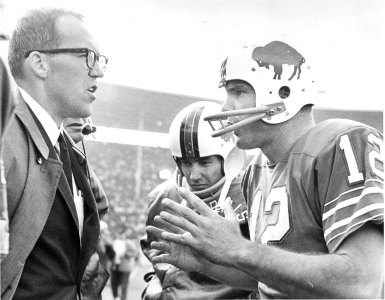
Joe Collier, former Bills coach and great defensive coordinator, dies at 91
Joe Collier, arguably the greatest defensive coordinator in Buffalo Bills history, died at age 91 on Monday night at his home in Littleton, Colo., the Denver Broncos announced.
Joe Collier, arguably the greatest defensive coordinator in Buffalo Bills history, died at age 91 on Monday night at his home in Littleton, Colo., the Denver Broncos announced.
Collier was the architect of the great Bills defenses that helped the team to back-to-back American Football League championships in 1964 and 1965.
He then became the third head coach of the Bills, succeeding Lou Saban in 1966. He coached Buffalo to a third straight AFL championship game that year, and one step short of its first-ever Super Bowl, but the Bills were defeated by the Kansas City Chiefs. Collier coached one more full season for the Bills, then was fired after the second game of the 1968 season.

Joe Collier, left, talks to quarterback Daryle Lamonica during a Bills game in 1966. Buffalo News file photo
Collier’s greatest fame in pro football came at his next stop, Denver. He enjoyed a 17-year run as defensive coordinator of the Broncos, and directed the “Orange Crush” defenses that helped get them to three Super Bowl appearances, in 1977, 1986 and 1987.
But Buffalo was where Collier first made his mark in pro football. He came as an aide to Saban from the Boston Patriots in 1962.
The AFL was known as an offensive league, with wide-open passing games and big-time scoring. The Bills bucked the trend. Collier’s Bills defense led the AFL in fewest points allowed in ’64, ’65 and ’66.
The Bills went 17 straight games without allowing a rushing touchdown, from the middle of the '64 season through the eighth game of ’65. That still is the longest in pro football since 1933.
“The guy was outstanding,” former Bills cornerback Booker Edgerson said of Collier in an interview with The Buffalo News in 2015. “I don’t like to call people geniuses. But he just knew things. He showed you things. He knew what people had the ability to do. Everything that he pointed out during the week would come true, and it made you a better ballplayer.”
Collier had great talent in Buffalo. The front four included defensive tackles Tom Sestak and Jim Dunaway, and ends Ron McDole and Tom Day. The linebackers were Mike Stratton, Harry Jacobs and John Tracey, who played 67 straight games together in the ‘60s. The defensive secondary included star cornerbacks Edgerson and Butch Byrd and safeties George Saimes and Hagood Clarke. Sestak and Saimes were named to the AFL’s All-Decade team.
Collier’s great strategy was part of the success. While the 4-3 was the Bills’ predominant defense, Collier was at the forefront of pro football by using the 3-4 intermittently throughout the ’64 and ’65 seasons.
The Bills beat San Diego, 20-7, for the AFL crown in ’64. The ’65 title-game victory over the Chargers, 23-0, was one of the greatest defensive performances in Bills history, if not the greatest.
“The first time we played them (in ’64), they had some injuries that hurt them, and we had our nice, muddy field that the fast guys couldn’t maneuver too well on,” Collier told The News on the 50th anniversary of the ’65 game. “So we had a couple advantages. The second one, it was a nice sunshiney day in San Diego, and they had all their players. It was a tougher situation.”
Collier decided rushing three and dropping eight into coverage would be a big part of the game plan. That helped in double-covering Hall of Fame receiver Lance Alworth. The Bills were mostly a man-to-man team.
“We played a lot of 3-4 defense with a zone behind it in that game,” Collier said. “We doubled Alworth. If he was on the strong side as a flanker, we’d double him with Hagood Clarke and Booker. If he was a split end, we’d double him with George Saimes and Booker.”
“We put Butch Byrd over Don Norton,” Collier said, referring to San Diego’s other wideout. “I knew Butch could handle Don the whole game by himself.”
Collier was born June 7, 1932, in Rock Island, Ill., and became a star wide receiver at Northwestern. Rather than join the NFL as a player, he decided to go into coaching.
He served at Western Illinois before joining Saban’s Boston staff in 1960.
As head coach of the Bills, he took over an aging team that had reached its peak.
His career rebounded in a big way in Denver.
During his entire tenure in Denver, the Broncos ranked second in touchdowns allowed (258), and sixth in rushing yards per game (123) and touchdowns per game (2.15).
“Collier’s loyalty to the Broncos extended beyond the playing field as a Ring of Fame Selection Committee member for more than 20 years dedicated to recognizing our all-time greats,” the Broncos said in a statement. “As we celebrate the extraordinary life and career of Joe Collier, our hearts go out to his three children (Joel, Julie and Lisa) along with his entire family and many friends.”
Collier was inducted into the Colorado Sports Hall of Fame in 2002.
